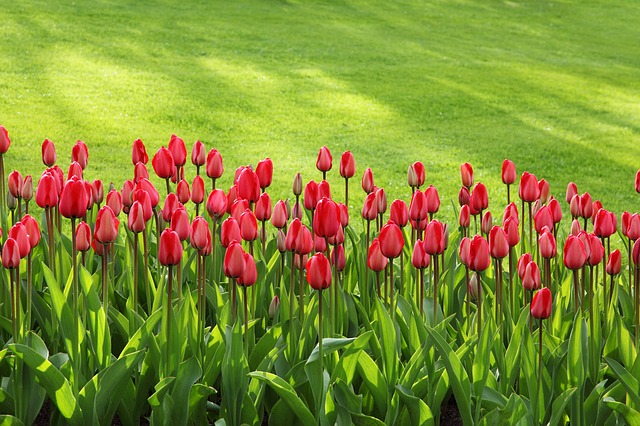
Gardening can be quite complex, when you break it down. For instance, you have to know certain things like pH balance in soil or things that can fend off bugs naturally when you get into gardening. Organic gardening can be quite challenging for anyone with limited experience. Read on to find some tips to make gardening in a clean, organic fashion a little easier and more fun to do!
Put down sod correctly. Start by preparing your soil with care. Remove weeds and break your soil until all the clumps are gone. Make sure your soil is flat and compacted. Make sure the soil is moist all the way through. You should lay your sod staggered, and have the joints offset. After the sod is in place, go over the surface to ensure everything is level. Use loose soil to fill in any gaps between seams. Water the sod every day for a couple of weeks. Then it should be rooted well and ready for foot traffic.
Clay soil makes working with a shovel difficult. The clay is hard and sticks to the shovel. Coat the shovel with floor or car wax, and buff it with a clean rag to make the job a lot easier. The wax will help keep dirt from sticking to the shovel, and will also keep the metal from rusting.
Do not plant perennials that are prone to snail infestation. Slugs and snails are voracious eaters that can destroy a plant literally overnight. These garden vermin prefer plants with tender, herbaceous stems and leaves, particularly seedlings and young plants. Slugs and snails will leave some perennials alone, particularly those with a bad taste or tough, hairy leaves. Examples of these slug-proof plant varieties include achillea, euphorbia, and helleborus, to name a few.
Garden vegetables should be planted in areas of the ground that receive a minimum of six hours of daily sunlight. Most vegetables that can be grown need that much sun to grow well and quickly. Some flowers are especially sun-loving as well.
Familiarize yourself with the optimum harvesting time of your vegetables. Every veggie variety has an ideal time frame for picking, so it’s important to catch them when their flavors peak. Veggies such as zucchini or baby peas, for instance, taste their best if they get picked young. On the other hand, tomatoes taste best when they are as ripe as possible from the vine. Take some time to learn about the best harvest time for the vegetables that you have growing.
Don’t use pesticides that aren’t meant to kill specific types of garden pests. These kinds of pesticides kill the helpful insects that destroy the pests. Beneficial bugs are more sensitive to these pesticides than the bugs that are detrimental to plants, so if the good bugs are eliminated, the bad pest population may grow. Your problem will only get worse and you will find yourself using more pesticides.
Include your children in your efforts to organic gardening. Children will benefit from the fresh air while bonding with you in your efforts to provide healthier food alternatives for them.
You can help to prevent your plants from developing diseases with aspirin water. Crush and dissolve one and one-half 325mg tablets in two full gallons of plain water. You can simply spray them with the mixture to help aid them in fighting off diseases. Give your plants a spray of the aspirin-water mixture about one time every three weeks.
It is important to protect your knees when you are horticulture. Bending over while gardening can be painful and unhealthy for your back. To get down to plant level without pain, try kneeling instead. Get knee pads or a small mat you can use to kneel on if the ground is too hard.
Once your seeds start sprouting, they do not need as much warmth as they needed before. As your plants grow, move them away from the source of heat. If you used plastic wrap to insulate your seedlings, you should now remove it. Check on your seeds periodically to make sure you know when to remove the films.
Use untreated wood, stone, or brick to build a raised bed. Be sure that any wood you use isn’t chemically treated, and will be able to resist rot naturally. Some good woods are locust, cedar and cypress. Avoid using treated wood in an organic vegetable garden. The chemicals in the wood can leak into the soil, and eventually into the plants. If you have used treated lumber, line your beds with plastic.
Now, you shouldn’t get your hopes up and believe that a few tips are going to turn you into an instant professional gardener. However, these tips are a great starting point if you do plan to grow organically. As you implement these tips and hone your skills, you’ll be a professional green-thumb-holder in no time.